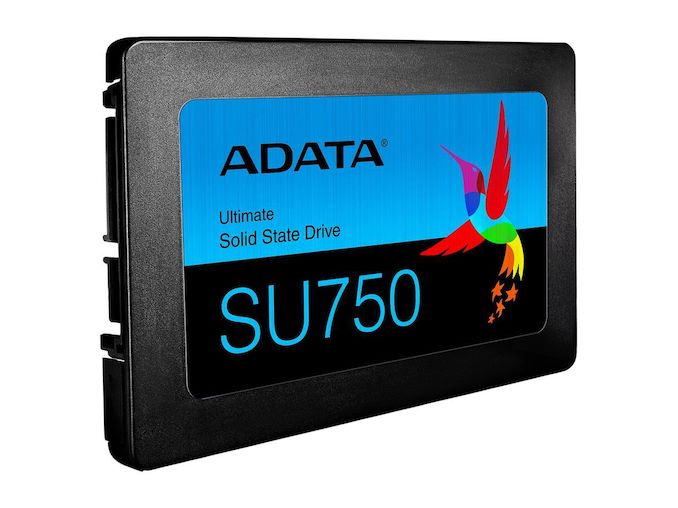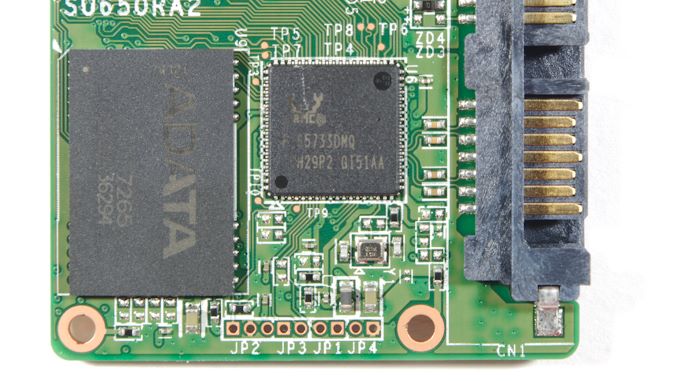The ADATA Ultimate SU750 1TB SSD Review: Realtek Does Storage, Part 1
by Billy Tallis on December 6, 2019 8:00 AM EST
Realtek may only be a household name for particularly nerdy families, but their chips are everywhere in the PC industry. They are best known for their near-ubiquitous audio codecs and for their networking chips. Their products are usually not known as the absolute best quality that money can buy, but they consistently offer "good enough" performance and feature sets combined with very affordable pricing that wins over OEMs and gets Realtek devices in the hands of any consumer that isn't deliberately avoiding them.
In recent years, Realtek has set their sights on the SSD market. Some of their earliest attempts to make SSD controllers were more or less failures (eg. a 55nm NVMe controller that could barely break 1GB/s), but they now have a full lineup of controllers are ready to compete in almost every market segment. This is where ADATA comes in; we can usually count on them to try out all the SSD controllers and NAND options available. They end up shipping more of those experiments than is really sensible, and that contributes to their confusingly broad product lineup. However, they are more judicious with their review sampling, which is why we're looking at Realtek's second-generation SSD controllers.
We're starting our look into ADATA's Realtek-based SSDs at the low end of the product stack, with the ADATA Ultimate SU750, a DRAMless SATA SSD using the RTS5733 controller and 3D TLC NAND. This drive is also being sold as the Amazon-exclusive ADATA SU760.
The RTS5733 controller is a mere two-channel design, which puts it in the same league as controllers like the Phison S11, used in a variety of budget SATA drives. Quite a few other budget drives use Silicon Motion 4-channel controllers like the SM2258XT, and they don't seem to have any trouble competing on cost with drives using smaller 2-channel controllers.
Part of Realtek's overall SSD controller strategy is an emphasis on reducing the need for external DRAM on the SSD; the performance penalties that come from having little or no DRAM are partially offset by including larger buffers on the controller itself, but the precise amount has not been disclosed.
| ADATA Ultimate SU750 SSD Specifications | |||||
| Capacity | 256 GB | 512 GB | 1 TB | ||
| Form Factor | 2.5" SATA | ||||
| Controller | Realtek RTS5733DMQ | ||||
| DRAM | None | ||||
| NAND Flash | Micron 64L 3D TLC | ||||
| Sequential Read | 550 MB/s | ||||
| Sequential Write | 520 MB/s | ||||
| Random Read | 65k IOPS | ||||
| Random Write | 75k IOPS | ||||
| Warranty | 3 years | ||||
| Write Endurance | 200 TB 0.7 DWPD |
400 TB 0.7 DWPD |
800 TB 0.7 DWPD |
||
| Current Retail Price | $31.99 (12¢/GB) |
$51.99 (10¢/GB) |
$94.99 (9¢/GB) |
||
The ADATA SU750 uses Micron 64L 3D TLC NAND flash memory, the same as most of ADATA's current SSD models. ADATA does their own binning and packaging of NAND, and it appears that the SU750 gets pretty good quality flash: the write endurance ratings are roughly 0.7 drive writes per day for the 3-year warranty period, equivalent to about 0.4 DWPD over 5 years. This is slightly higher endurance than quite a few of ADATA's own SSDs that come with 5-year warranties. If anything, we usually expect DRAMless SSDs to get lower endurance ratings due to less effective wear leveling.
The use of a DRAMless, two-channel controller doesn't hurt the sequential IO specs for the SU750, but it does lead ADATA to give it lower random IO performance ratings than mainstream drives that can saturate the SATA link. The random read performance takes the bigger hit, which is normal for DRAMless drives.
The construction of the SU750 is typical for a low-end SATA drive. The case is half metal, half plastic, and held together with clips rather than screws. The PCB inside takes up only a third of the available space. The bulk of that PCB space is taken up by two NAND packages on each side, containing 256GB each for our 1TB sample. The two-channel DRAMless controller itself has a fairly low pin count and consequently small footprint.
The Competition
We don't get really low-end SSD samples very often, but we do have the Toshiba TR200 as a representative of the many drives that use the Phison S11 controller with Toshiba NAND. We also have the Samsung 860 QVO, a QLC-based SSD that belongs in this entry-level segment even if Samsung refuses to price it accordingly. Also of note is the ADATA SU800, an older model with Micron 32-layer 3D TLC that is slower and cheaper than current mainstream SATA drives, but usually outperforms any DRAMless SATA drive thanks to the SU800's DRAM buffer. (Note that the largest SU800 we have is the 512GB model, so it's at a potential disadvantage to the 1TB SU750.) The rest of the drives we are comparing the SU750 to are in higher tiers, though the price differences between mainstream SATA drives and an entry-level model like the SU750 can be all but erased by a good sale.
The Crucial BX500 and Mushkin Source are similar DRAMless SATA drives in direct competition with the SU750. We've tested a smaller capacity of the Source, but have not tested the BX500.
| AnandTech 2018 Consumer SSD Testbed | |
| CPU | Intel Xeon E3 1240 v5 |
| Motherboard | ASRock Fatal1ty E3V5 Performance Gaming/OC |
| Chipset | Intel C232 |
| Memory | 4x 8GB G.SKILL Ripjaws DDR4-2400 CL15 |
| Graphics | AMD Radeon HD 5450, 1920x1200@60Hz |
| Software | Windows 10 x64, version 1709 |
| Linux kernel version 4.14, fio version 3.6 | |
| Spectre/Meltdown microcode and OS patches current as of May 2018 | |
- Thanks to Intel for the Xeon E3 1240 v5 CPU
- Thanks to ASRock for the E3V5 Performance Gaming/OC
- Thanks to G.SKILL for the Ripjaws DDR4-2400 RAM
- Thanks to Corsair for the RM750 power supply, Carbide 200R case, and Hydro H60 CPU cooler
- Thanks to Quarch for the HD Programmable Power Module and accessories
- Thanks to StarTech for providing a RK2236BKF 22U rack cabinet.














54 Comments
View All Comments
Samus - Sunday, December 8, 2019 - link
I didn't even want to bring up Killer XDdeil - Monday, December 9, 2019 - link
Well ONLY cards where I lost sound due to broken drivers is realteck. AND coincidentally ONLY network adapter that was supposed to do full gigabit, and stopped negotiation at 10 mbps was also realteck.they can do decent hardware, but soft from them is crappiest as possible.
HollyDOL - Saturday, December 7, 2019 - link
My 1st hand experience with Realtek dates back to Pentium 4 era. And it was so bad then I am still avoiding anything done by them in almost panic mode. Maybe they improved since then, but I am still not in state of mind to spend few $ to try.Gigaplex - Saturday, December 7, 2019 - link
Intel was terrible in the Pentium 4 era. Do you also avoid Intel in the same way?HollyDOL - Saturday, December 7, 2019 - link
Intel never had problems with functionality or output quality. For many scenarios you had better perf/$ on Athlons, but you didn't have problems having multiple computers on same network with Intel NIC having same MAC, lousy sound quality infested with noise or very low NIC performance.So no, I am not avoiding Intel same way since I never had remotely similar problems with them.
close - Saturday, December 7, 2019 - link
They weren't that bad. After building a neighborhood network (100Mbps and constantly saturated with Direct Connect P2P transfers) with thousands of clients (perhaps in the 5 figures or close to), 99.9% being Realtek network chipsets I'd say many of the issues are a bit overstated. Sure Intel was (is?) better but other than crappy support in Linux at that time, there was nothing out of the ordinary bad with Realtek. Not one MAC issue, not very low performance.I'm sure those thousands are not representative of all Realtek sales but I think there must also be some bias in there where the multitude of reports on forums makes you think it's an absolute rule that they were crap. Sound cards... dunno, had them on many PCs but rarely cared about the sound back in the day.
Samus - Sunday, December 8, 2019 - link
Terrible performance maybe. But Intel has always been fairly reliable. They've had a few minor chipset recalls, and the embarrassing, but very limited Pentium III recall, but on the whole they have traditionally had less errata than AMD and quite frankly their chipsets were always the gold-standard of PC's. Their network controllers are among the best in the world.PeachNCream - Friday, December 6, 2019 - link
ADATA has gotta get out of this town, out of this town and out of L.A. - with those prices. TRIM them to around $80 for 1TB and they will have a Solid pricing State to Drive sustained sales.bananaforscale - Friday, December 6, 2019 - link
Realtek does Dallas Semi?Lord of the Bored - Friday, December 6, 2019 - link
No, Maxim did Dallas Semiconduotor.